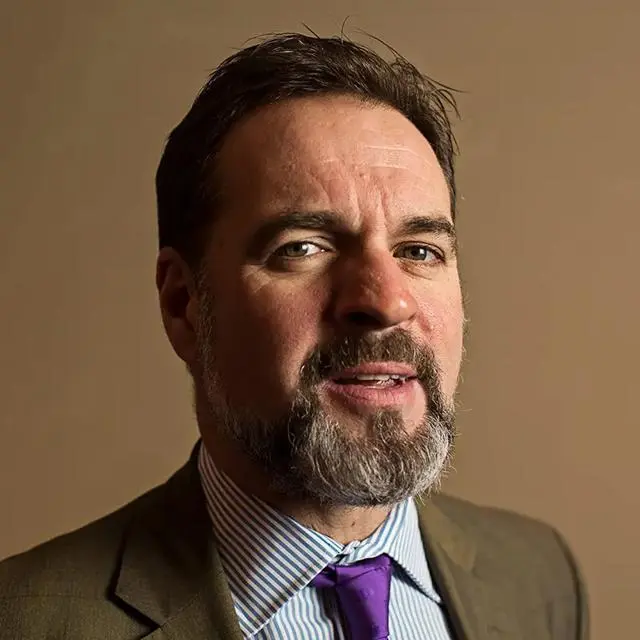Conservative Historian Sir Niall Ferguson Discusses Trump, Information Networks in Final Point/Counterpoint Event
The eminent historian discussed themes from his most recent books about networks and catastrophes while arguing that portrayals of Trump as a fascist are mistaken.

Sir Niall Ferguson, a prominent conservative historian, spoke to members of the Amherst community in the Red Room on Monday afternoon to conclude this year’s Point/Counterpoint series.
In a wide-ranging conversation with Lawrence Douglas, professor of law, jurisprudence, and social thought, Ferguson criticized the characterization of President-elect Donald Trump as a fascist, elaborated on the role that information networks play in political relations, and ruminated on the difficulty in predicting future catastrophes.
Douglas first asked Ferguson why he felt Trump’s reelection was not “a disaster for our nation and for the world.” Ferguson explained that, in his eyes, Trumpism has its roots in populism and that many are mistaken in imagining that a fascist administration is forthcoming.
“He’s not a fascist,” he said of Trump. “He’s part of the rather long American populist tradition, which is concerned with immigration. It is committed to tariffs rather than free trade. It’s anti-elitist. That's what Trump is.”
One critical element of fascism that Trumpism lacks is a “militaristic” impulse, Ferguson said.
“I don't think that’s ever been a feature of Trumpism. One distinct figure of Trump is his anti-militarism. He is hostile to wars,” Ferguson said. “He has fallen out with the U.S. military so completely that it's hard to imagine any general getting a job in the second Trump administration.”
Ferguson referenced “It Can’t Happen Here,” a 1935 novel by Sinclair Lewis that imagines a fascist dictator rising to power in America, to explain how he felt many public intellectuals, such as the eminent historian Timothy Snyder, are mistaken in their diagnosis of Trump as a fascist.
“[Snyder] is making a huge category error because he thinks we are witnessing inter-world war East or Central European events in the United States … Not much that Lewis writes about shows any sign of happening in the United States today,” he said. “There’s nothing that I can think of in any of the many statements that the Trump campaign issued that poses a threat to the Constitution explicitly.”
In response to a student question that compared Trump’s rhetoric to that of Hitler, Ferguson emphasized that Trump lacks both Hitler’s “ferocious language” and his impulse to dismantle the constitutional system of his state.
“Please let me know as soon as you hear that comparable steps have been taken by the new administration,” he said. “I don’t think any of that's going to happen because I think it’s a fantasy to imagine, just as it was in [Lewis’] book, that that could, in fact, happen here.”
As for the reasons for Trump’s victory, Ferguson argued that many Trump voters were not responding to the existential question “Empire or Republic?” but instead to the more tangible one: “Are you better off than four years ago?” Because of this, Ferguson claimed that the most appropriate comparison for Trump is not to Hitler but to Ronald Reagan, and that our current political moment most acutely resembles the fall of 1980, when Reagan won the presidency.
“One thing that’s really striking about 1980 is that most liberals and their European counterparts regarded Reagan with almost as much horror as they regard Trump,” Ferguson said. “Tim Snyder thinks this is 1933 in Germany. It’s just 1980 in America.”
Apart from his discussion of Trump, Ferguson devoted a large portion of the talk to the subject of information networks and the role they play in our political world. Ferguson drew in particular from his 2018 book “The Square and the Tower,” which he described as an attempt to “show that much historical change can be understood in terms of contagions through social networks.”
A central thrust of his argument was that human networks tend to polarize due to the phenomenon of “homophily,” a phenomenon that is exacerbated by large technological breakthroughs. Due to this effect, Ferguson argued, the rise of the internet can help explain the massive polarization of our current world and the politicization of seemingly straightforward concepts, such as masks and vaccines during the pandemic.
Ultimately, Ferguson concluded that the solutions to ending these “information pandemics” are rather extreme.
“I think we’ve got no solution to this problem. You either choose the China option, which is total censorship … or you have the hellscape,” Ferguson said. “It’s really hard to have something in the middle, which is free speech — as long as nobody says anything that I personally find offensive.”
Towards the end of the talk, Ferguson spent time discussing his 2021 book “Doom: The Politics of Catastrophe,” and one of its central claims: “We’re really bad at knowing what the next disaster will be, and that's because it's inherently hard.”
Ferguson cited the world’s lack of readiness for the pandemic, even in the midst of preoccupation with climate change, as an example. As a result, Ferguson said he thinks the world could rethink its strategy towards predicting future catastrophes.
“The point of ‘Doom’ was to teach us some of that humility and then to realize as a consequence that we can’t plan meticulously for our preferred disaster. We just have to prepare for the whole range of possible disasters and respond rapidly to whichever one comes along next,” he said.
Just as Earth’s unexpected nature can shape history in surprising ways, Ferguson argued that people can have a similar effect.
“People, particles with consciousness … they just won’t obey any Newtonian laws. They will just refuse to do that. And that’s what makes history hard, and that’s why we can’t predict the future,” he said.
Reflecting on the event, Grace Puchalski ’27 concluded that it was “well worth my time.”
“I thought the positive view of the stage we’re at in America [is] beneficial for Amherst students to understand,” Puchalski said.
Isaac Oh ’27, who also attended the event, said he enjoyed the talk but felt that Ferguson’s arguments could be repetitive.
“I think that he tended to draw on only a couple examples, especially with regards to Trump. He compared him a lot to Hitler, but I feel like maybe there would be other historical examples of populists coming to power that could have yielded additional insights.”
Ultimately, Oh appreciated the “air of humility that he had the whole time.”
“The thrust of his argument was [that] you cannot predict the future. I can’t predict the future, and I think it was a really great message to give to a bunch of aspiring students,” he said.
Despite his repeated warnings about the absence of certainties in history, Ferguson remained adamant about one of the talk’s central themes.
“I don’t think Donald Trump is either interested or capable of overthrowing the Constitution. Or if he were capable of it, I can guarantee he will not be a candidate for election in 2028,” Ferguson said. “That I’m 100% confident in.”





Comments ()